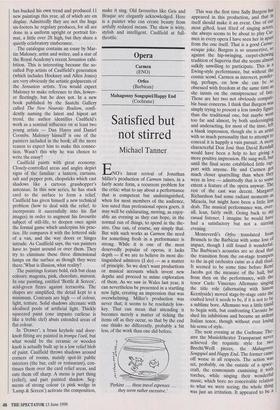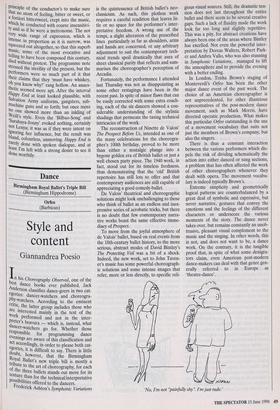Opera
Orfeo (Barbican)
Satisfied but not stirred
Michael Tanner
ENO's latest revival of Jonathan Miller's production of Carmen raises, in a fairly acute form, a recurrent problem for the critic: what to say about a performance that is competent but undistinguished, when for most members of the audience, less sated than professional opera goers, it may well be exhilarating, moving, as enjoy- able an evening as they can hope, in the normal run of things, to spend in the the- atre. One can, of course, say simply that. But with such works as Carmen the need for something fresh in a performance is strong. While it is one of the most deservedly popular of operas, it lacks depth — if we are to believe its most dis- tinguished admirers (I do) — as a matter of principle. So we don't want productions or musical accounts which invent new depths and proceed to mime exploration of them. As we saw in Wales last year, it can nevertheless be presented in a startling new light, creating an impression that was overwhelming. Miller's production was never that; it seems to be resolutely low- key. That can mean that attending it becomes merely a matter of ticking the items off as they occur, so that by the end one thinks no differently, probably a bit less, of the work than one did before.
Perkins . .. these travel expenses . . . they seem rather excessive.' This was the first time Sally Burgess has appeared in this production, and that in itself should make it an event. One of our most gifted, least feted of singing actors, she always seems to be about to play Car- men in every opera I have seen her in apart from the one itself. That is a good Carve' nesque joke. Burgess is so unassertive, S° against the hip-swinging, carpet-chewing tradition of Supervia that she seems almost sulkily unwilling to participate. This is a Ewing-style performance, but without the cosmic scowl. Carmen as introvert, ponder- ing, perhaps, on how she can be so obsessed with freedom at the same time as she insists on the omnipresence of fate. Those are her two not obviously cornpati" ble basic concerns. I think that Burgess was simply trying to present a less tawdry figure than the traditional one, but maybe went too far and almost, by both undersinging and underacting, for most of the time, left a blank impression, though she is an artist with so much personality that to attempt to conceal it is happily a vain pursuit. A more characterful Don Jose than David Rendall would have been a help to her giving a more positive impression. He sang well, but until the final scene established little rap- port with anyone. He and Carmen got much closer quarrelling than when they were in love — admittedly that is to some extent a feature of the opera anyway. The rest of the cast was decent. Margaret Richardson had some radiant moments as Micaela, but might have been a little less drab. The musical performance was, over- all, lean, fairly swift. Going back to re casual listener, I imagine he would have had a satisfactory but not a stirring evening.
Monteverdi's Orfeo translated from Brussels to the Barbican with some loss of impact, though I still found it wonderful- The Barbican's acoustics are so dead that the transition from the on-stage trumpets to the in-pit orchestra came as a dull thud. It seemed to be some time before Rene Jacobs got the measure of the hall, but from then on the performance, with the tenor Carlo Vincenzo Allemano singing the title role (alternating with Simon Keenlyside) moved stage-by-stage onto the exalted level it needs to be, if it is not to be a sublime bore. Allemano was a little timid to begin with, but confronting Caronte he shed his inhibitions and became an ardent Italian tenor, though without ever losing his sense of style. The next evening at the Cochrane The' atre the Musiektheater Transparant never achieved the requisite style for two Brecht/Weill pieces, the Mahagonny Songspiel and Happy End. The former came off worse in all respects. The action was set, probably, on the outside of a space- craft, the cosmonauts examining it With torches, while singing their wonderful music, which bore no conceivable relation to what we were seeing; the whole thing was just an irritation. It appeared to be a principle of the conductor's to make sure that no atom of feeling, bitter or sweet, or a fortiori bittersweet, crept into the music, which he conducted with coarse insensitivi- ty and as if he were a metronome. The not very. wide range of expression, which is Intense in proportion as it is narrow, was squeezed out altogether, so that this superb music, some of the most evocative and telling to have been composed this century, died without protest. The programme note stressed the sterility of the present, but the Performers were so much part of it that their claims that they 'must have whiskey, oh you know why!' rang hollow. An anaes- thetic seemed more apt. After the interval Happy End at least looked plausible, with Salvation Army uniforms, gangsters, sub- machine guns and so forth; but once more no one showed more than an inkling of style. Even the 'Bilbao-Song' and Surabaya-Jonny' evoked nothing, certainly 11. ot Lenya; it was as if they were intent on Ignoring her influence, but the result was bland, colourless, unmoving. Happy End is rarely done with spoken dialogue, and at least I'm left with a strong desire to see it done worthily.



































































 Previous page
Previous page